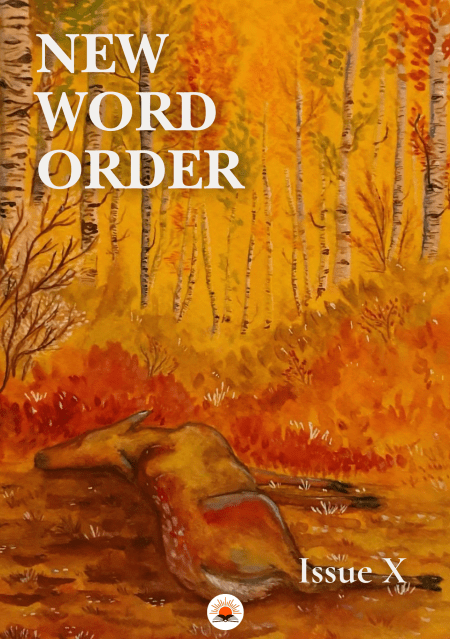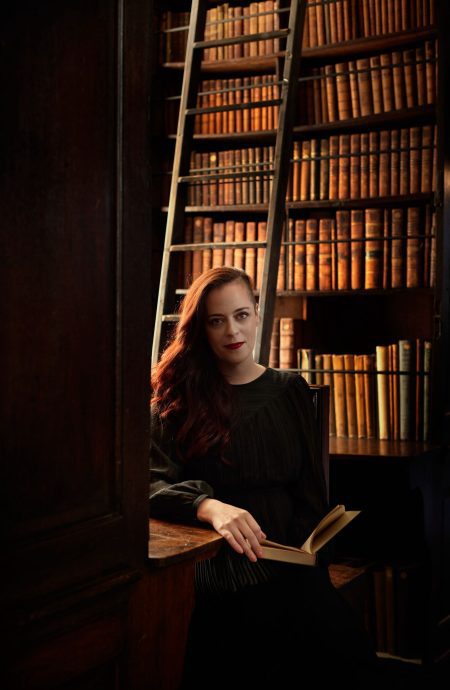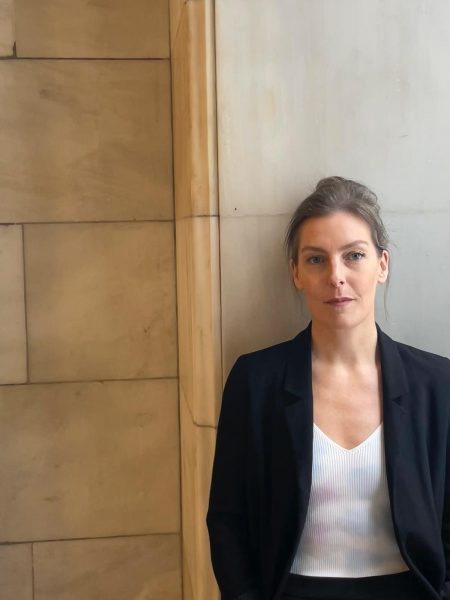Photography by Bríd O’Donovan.
Doireann Ní Ghríofa is a poet and essayist. Her prose début A Ghost in the Throat was awarded the James Tait Black Prize for Biography and described as “powerful” (New York Times), and “captivatingly original” (The Guardian). She is also author of six critically-acclaimed books of poetry, each a deepening exploration of birth, death, desire, and domesticity. Awards for her writing include a Lannan Literary Fellowship (USA), the Ostana Prize (Italy), a Seamus Heaney Fellowship (Queen’s University), and the Rooney Prize for Irish Literature.
Thank you so much to Doireann for agreeing to take part in this incredible interview for issue three of The New Word Order, and for putting so much thought into her answers. Her words are truly inspiring and we are privileged to have gotten the chance to speak with her.
Q: I’ll start with some questions about your 2020 bestselling book A Ghost in the Throat if that’s okay- you have said that often female lives can be neglected or go untold. Although you do not describe this book as a feminist text, was it intentionally a commentary of female inequality in Irish literature?
A: Certainly. A Ghost in the Throat is the story of a quest, in which a woman (who looks a lot like me!) becomes obsessed with discovering more about the life of an 18th century poet named Eibhlín Dubh Ní Chonaill. It’s important to note that the literary legacy of Eibhlín Dubh hadn’t been neglected per se – in fact, in some ways, the opposite is true, since her poem “Caoineadh Airt Uí Laoghaire” is an extraordinarily important element of our literary canon. What astounded me, however, was how little information was available on the broader circumstances of her life. Suffering as I do from Imposter Syndrome, I didn’t feel it was my place to attempt such a biography, but the more I longed to read such a book, the more my curiosity grew, and eventually I realised that I simply had to attempt to write this book myself.
Q: Other than reviving Eibhlin Dubh’s past, was there anything else you set out to do when writing A Ghost in the Throat?
A: It was important to me that I reveal to the reader how messy the biographical urge can be, and to be frank about how ill-equipped someone like me would be to attempt such a task. So often, when we read history, the chaotic bits of the research, the misinterpretations and mistakes, and all the various confusions that always occur, have been edited out. I sought to show the opposite, I wanted to be open with the reader about all the failures that can occur along the way.
Q: As any reader of this work will know you were hugely impacted by Eibhlín Dubh’s Caoineadh Airt Uí Laoighaire, is there any contemporary work that has impacted you recently?
A: Lindsey Drager’s Archive of Alternate Endings is a wildly exciting novel in which characters’ lives intersect around the arrivals of Halley’s Comet once every 75 years… I read it ages ago and it’s still on my mind. I recently had a sneak preview of In Her Jaws, soon to be published by Banshee Press. Rosamund Taylor’s spectacular poems leap from the page, in vivid glimpses of history and nature, love and wildness and power. It’s a wonderful book. There’s one book I’ve been itching to read for ages, but I am saving it for the perfect moment: Emer McLysaght and Sarah Breen’s Aisling and the City. It’s on my Santa list, and I can’t wait to curl up with it over the Christmas break.
“I sought to show the opposite, I wanted to be open with the reader about all the failures that can occur along the way”
Q: Where do you go for inspiration when writing?
A: I always draw inspiration from visiting the locations I am writing about – there’s something mysterious in the way that a place will always, always yield a new clue, if only we place ourselves within that landscape. When we’re immersed in our work it’s tempting to stay indoors in that act of creation, but taking some time outdoors can crack everything open.
Q: Has your experience with writing A Ghost in the Throat and its fabulous reception converted you to longer form works? Is historical research something you would consider doing again?
A: Well, my current project is a book-length work of prose, so I suppose the answer to this question is yes. In many ways, Eibhlín Dubh guided me towards learning another form, and taught me the skills necessary to embark on new projects. I am still persecuted by Imposter Syndrome, but my adventures with Eibhlín Dubh have helped me to find ways to sneak past it by trapdoors, shortcuts, and disguise. And yes – I am currently immersed in researching my next book, which delves into a very different era.
Q: The theme for this issue of our literary magazine The New Word Order is Progression. Do you find yourself in a state of progression in terms of your writing, following the last two years of lockdowns and restrictions?
“To feel absorbed in a state of progression is a gift… even on a bad day, to sense some small progression in our artistic work can be such a consolation”
A: I’m at a point in my current writing project where I am deeply absorbed in research, and the sense of excitement and discovery we so often feel when we begin to a new project. To feel absorbed in a state of progression is a gift… even on a bad day, to sense some small progression in our artistic work can be such a consolation.
Q: Most of the magazine’s contributors and its readers are made up of young, aspiring writers. Would you have any advice for finding a way to improve and progress your writing?
A: I often recommend putting the subconscious to good use – keep a notebook/phone next to the bed and in those last moments before sleep, focus on the project you are engaged with. It’s extraordinary what ideas are lurking there, once the lights are off and the mind turns towards dream. Use that time well!
Q: As a writer and poet do you have any words of wisdom for budding creators, setting their sights on the industry?
A: Know that every single artist you admire has experienced (and, often, continues to experience!) repeated moments of rejection and failure. Learning to accept moments of disappointment as an ordinary part of an artistic life is imperative. Everyone has moments of being knocked to the ground and getting their knees scraped. Everyone faces the daily choice whether to keep going or give up. Try to remember that in moments of downheartedness: you are far from alone. Persist.



